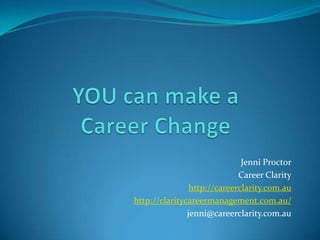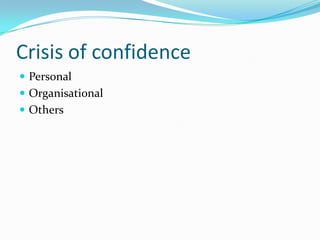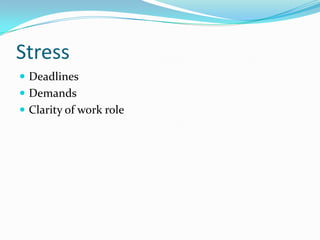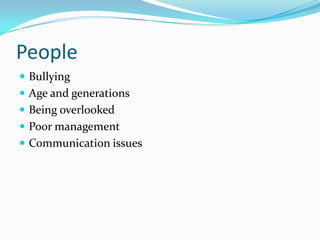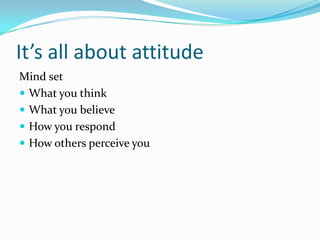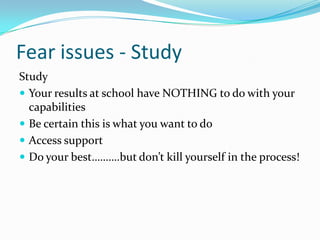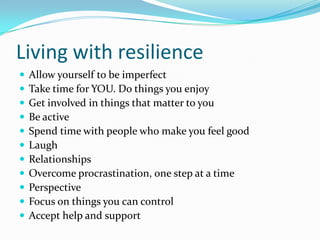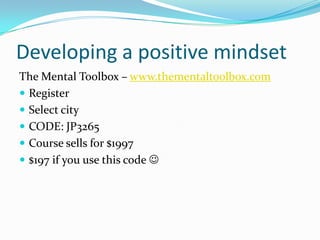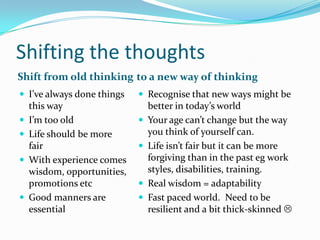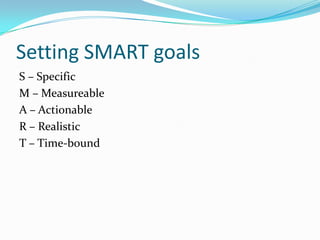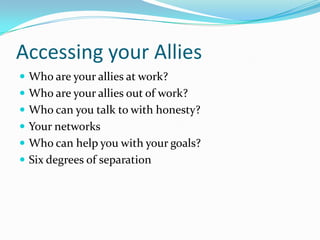Career Change Series confidence
- 1. Jenni Proctor Career Clarity http://careerclarity.com.au http://claritycareermanagement.com.au/ jenni@careerclarity.com.au
- 3. Crisis of confidence Personal Organisational Others
- 4. Changes Ways of doing things New technology Cultural changes Atmospheric shifts
- 5. Stress Deadlines Demands Clarity of work role
- 6. People Bullying Age and generations Being overlooked Poor management Communication issues
- 7. It’s all about attitude Mind set What you think What you believe How you respond How others perceive you
- 8. Fear factor Don’t want to end up worse off Consider the options from every angle Research Evaluate the options – Consider Plus, Minus and Interesting factors Learn to have an optimistic viewpoint Visualise what you want rather than worry about what you fear
- 9. Fear Issues – Going backwards What is the worst that could happen? What is the BEST that could happen? What is the most likely outcome? Listen to your instinct as well as your logical mind
- 10. Fear issues - Study Study Your results at school have NOTHING to do with your capabilities Be certain this is what you want to do Access support Do your best……….but don’t kill yourself in the process!
- 11. What is resilience? Ability to “bounce back” Reduces the impact of negative experiences Long term stressors…..coping strategies Short term stressors……dealing with it Different people deal in different ways Health and wellbeing Individual factors – genetics, personality Life history and experience Social and community support
- 12. Indicators of resilience Make and carry out realistic plans Positive/optimistic view of self Confidence in strengths and abilities Skills in communication Skills in problem solving Able to manage strong emotions and impulses
- 13. Living with resilience Allow yourself to be imperfect Take time for YOU. Do things you enjoy Get involved in things that matter to you Be active Spend time with people who make you feel good Laugh Relationships Overcome procrastination, one step at a time Perspective Focus on things you can control Accept help and support
- 14. A resilient mindset Accept Change……It’s inevitable Avoid viewing problems as impossible Develop a hopeful outlook – Optimism is learned Visualise what you want rather than worry about what you fear Progress towards realistic goals “What is one thing I can do today that will help me move in the direction I want to go?”
- 15. A resilient mindset Take decisive action. Don’t hide your head in the sand! Keep things in perspective. Avoid catastrophizing Nurture a positive image of yourself Trust your instincts and your ability to solve problems Take opportunities for self-discovery and growth
- 16. Developing a positive mindset The Mental Toolbox – www.thementaltoolbox.com Register Select city CODE: JP3265 Course sells for $1997 $197 if you use this code
- 17. Shifting the thoughts Shift from old thinking to a new way of thinking I’ve always done things Recognise that new ways might be this way better in today’s world I’m too old Your age can’t change but the way Life should be more you think of yourself can. fair Life isn’t fair but it can be more With experience comes forgiving than in the past eg work wisdom, opportunities, styles, disabilities, training. promotions etc Real wisdom = adaptability Good manners are Fast paced world. Need to be essential resilient and a bit thick-skinned
- 18. Improving interpersonal skills Smile Be appreciative Pay attention to others. Show them respect Practice active listening Bringing people together….fairness, respect, inclusion Resolve conflicts Communicate clearly and carefully Keep a sense of humour, but not at others’ expense Empathy – See things from others’ perspectives Don’t whinge!
- 19. Dealing with life changes Victim vs Taking Control Accept reality Try to find some positives in the situation Actively make new plans to suit the circumstances Create an Action Plan Break your goals down into bite sized chunks Deal with a day at a time if that’s all you can manage.
- 20. Setting SMART goals S – Specific M – Measureable A – Actionable R – Realistic T – Time-bound
- 21. Accessing your Allies Who are your allies at work? Who are your allies out of work? Who can you talk to with honesty? Your networks Who can help you with your goals? Six degrees of separation
- 22. Time flies……………. Who are you reporting to? When? What will you have done by then? What will happen if you don’t do what you say you are going to do?
- 23. Taking Action Nothing changes if you don’t take action What is stopping you? Procrastination = Bad habit Procrastination = Fear of something What is your lack of action costing you?
- 24. Motivation Motivation to achieve something Motivation to avoid something Motivation is the strength of your desire to change What will you gain by doing this? What will you lose by NOT doing this? M=D/P Motivation = Desire for change Pain
- 25. Jenni Proctor Career Clarity http://careerclarity.com.au http://claritycareermanagement.com.au/ jenni@careerclarity.com.au
